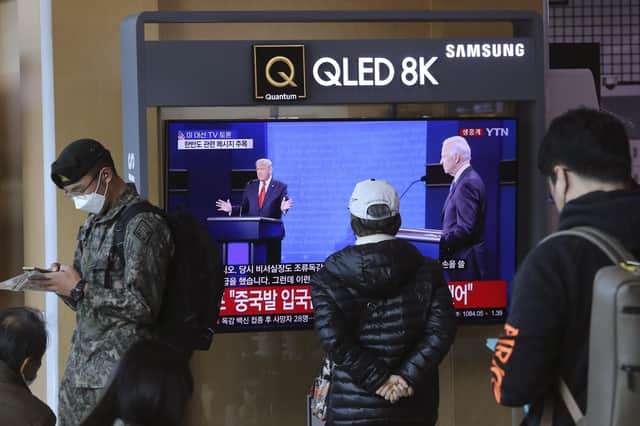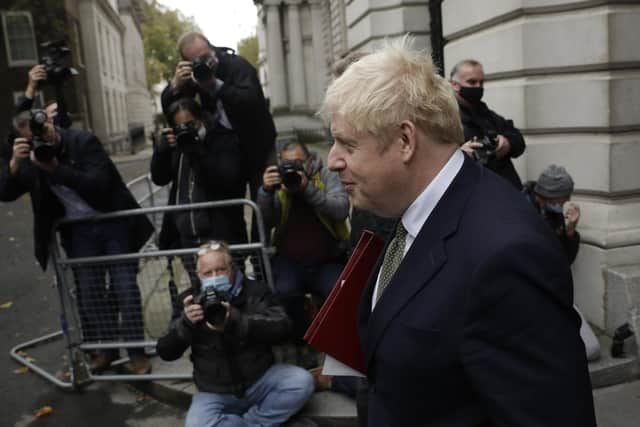US election: Donald Trump must lose to Joe Biden for the sake of democracy the world over – Susan Dalgety


As Donald Trump, 74, and Joe Biden, 77, limber up for the final round in their campaign to win the US presidency, there’s much more at stake than who gets to command the West Wing for four years.
If Biden wins, America can start the long, slow path to recovery. If Trump prevails, the land of the free will become the personal fiefdom of a strongman and his family. Democracy, that most fragile of concepts, will be under threat as Trump flexes his authoritarian muscles.
Advertisement
Hide AdAdvertisement
Hide AdBut does it matter to us who wins the US elections on November 3? Don’t we have enough to worry about with Brexit and Covid-19 to care about who lives in the White House?
You might very well think that, Barack Obama says otherwise. In a speech earlier this year, welcoming his old friend Joe Biden’s nomination as the Democrats’ presidential candidate, Obama summed up why democracy matters.
"This crisis [coronavirus] has reminded us that government matters," he said. "It's reminded us that good government matters, that facts and science matter, that the rule of law matters.
“That having leaders who are informed and honest and seek to bring people together, rather than drive them apart – those kind of leaders matter. In other words, elections matter."


UK credit rating falling
Still not convinced? Let’s take a look at a few random events from the last few days, here in our United Kingdom.
Moody’s – the credit agency that decides on a country’s fiscal trustworthiness – announced that it was downgrading Britain’s credit rating, and not just because of the high debt and low growth caused by the double whammy of Brexit and Covid-19.
“The third driver relates to the weakening in the UK's institutions and governance that Moody's has observed in recent years, which underlies the previous two drivers,” read their press release.
Our country, which has long prided itself on the integrity of its democracy, appears to be on the slide. “The quality of the UK's legislative and executive institutions has diminished in recent years,” continued Moody’s, in a damning critique that matters far more than the Chancellor borrowing a few billion to keep the economy afloat.
Advertisement
Hide AdAdvertisement
Hide AdPoor leadership and weak institutions led to the grotesque spectacle we witnessed in the House of Commons this week, when Tory MPs lined up behind the Prime Minister to vote down a Labour motion to provide free school meals during holidays until Easter next year.
Boris Johnson’s government refused to find £20 million a week to feed hungry kids in the face of strong public opinion, yet in recent months the Tories have given more than £1 billion of government contracts to private firms, many run by their “friends and donors”, according to analysis by the Good Law Project.
Moral leadership from a young footballer
The Prime Minister clearly has no desire to “bring people together”. Struggling families must now look, not to their elected representatives for moral and practical support during these unprecedented times, but to a 22-year-old footballer, Marcus Rashford, whose free school meals campaign has pushed food poverty up the political agenda.
Of course, things are better in Scotland, where the devolved government has set aside millions to pay for free school meals during the holidays. But before we start patting ourselves on the back and crowing about our moral superiority over our English friends and neighbours, let’s consider what “good government” looks like in Edinburgh.
One of the basic rules of good government is the separation of party and state. Yet in contemporary Scotland, this important principle is in danger of being eroded. Our small country is ruled by a power couple. The head of the ruling party is married to the leader of our government – a situation that would be regarded as untenable in most countries, yet is shrugged aside here.
And a row that exploded on social media on Thursday between Jason Leitch, Scotland’s national clinical director – a civil service post – and Richard Leonard, leader of the opposition Scottish Labour party, suggests that the lines between party and state are becoming increasingly blurred. A suspicion compounded when the interim chief medical officer, Gregor Smith – another civil servant – attacked the media for daring to do their job of holding the government to account.
Democracy improving in just one country
No-one is suggesting that Nicola Sturgeon is going to follow the example of China’s president, Xi Jinping, and merge party and state, nor that she wants to declare herself ruler for life. But as America has shown, it is all too easy for even the most settled of democracies to slip into demagoguery.
And while I am confident that Boris Johnson is not in politics solely to enrich himself and his cronies, his government’s decision to award multi-million-pound contracts to companies with links to his party must surely sound warning bells. Johnson may not have a bank account in China, as Trump does, but he is no stranger to being wooed by rich oligarchs.
Advertisement
Hide AdAdvertisement
Hide AdBut as democracy in America and the UK flounders, in one small country it is flourishing.
A report published earlier this month by Washington think-tank, Freedom House, examined the current state of democracy in 192 countries.
“Since the coronavirus outbreak began, the condition of democracy and human rights has grown worse in 80 countries,” its report states. “Governments have responded by engaging in abuses of power, silencing their critics, and weakening or shuttering important institutions...”
Democracy has remained “about the same” in a further 111 countries, with it getting stronger in only one – Malawi.
There are strong civil society links between Scotland and Malawi, and its two governments have a formal partnership. For too long, the richer country has been seen as an exemplar for good governance. Perhaps it’s now time our politicians took lessons in democracy from the warm heart of Africa.
Read the Freedom House report at freedomhouse.org/report/special-report/2020/democracy-under-lockdown
A message from the Editor:
Thank you for reading this article. We're more reliant on your support than ever as the shift in consumer habits brought about by coronavirus impacts our advertisers.
If you haven't already, please consider supporting our trusted, fact-checked journalism by taking out a digital subscription.
Comments
Want to join the conversation? Please or to comment on this article.